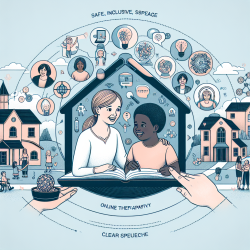Introduction
The COVID-19 pandemic has left a profound impact on various aspects of life, particularly on the mental health of children and adolescents. Recent research, titled "COVID-19 impacts and adolescent suicide: The mediating roles of child abuse and mental health conditions," delves into the intricate relationships between pandemic-induced disruptions and adolescent suicidality. As practitioners in the field of education and mental health, understanding these dynamics is crucial for effective intervention and support.
Understanding the Research
The study utilized data from the Adolescent Behaviors and Experiences Survey (ABES), conducted by the CDC in the United States. It explored how employment disruptions and school closures during the pandemic influenced suicidal ideation and behavior among adolescents. The research highlighted the mediating roles of child psychological and physical abuse and subsequent mental health conditions.
Key findings include:
- School closures were found to reduce child abuse and suicidal ideation and behavior.
- Employment disruption did not directly predict suicidal behavior but did so through the lens of child abuse.
- Mental health conditions significantly mediated the relationship between psychological abuse and suicidal behavior.
- Sexual orientation emerged as a consistent and significant risk factor.
Implications for Practitioners
For practitioners, these findings underscore the importance of a multi-faceted approach to supporting adolescents. Here are some actionable insights:
- Enhance Monitoring and Support: Schools and mental health professionals should increase monitoring for signs of abuse and mental health struggles, especially during periods of disruption.
- Promote Safe Environments: Encourage environments, both at home and in schools, where adolescents feel safe and supported. This includes fostering strong relationships with trusted adults.
- Address Mental Health Directly: Implement programs that directly address mental health issues, providing adolescents with coping strategies and support networks.
- Inclusive Policies: Develop policies that are inclusive and sensitive to the needs of LGBTQ adolescents, who are at a higher risk of suicidal behavior.
Encouraging Further Research
While this study provides valuable insights, it also highlights the need for further research. Understanding the long-term impacts of COVID-19 on adolescent mental health and suicidality is crucial. Practitioners are encouraged to engage in ongoing research and contribute to a growing body of knowledge that can inform policy and practice.
Conclusion
The pandemic has posed unprecedented challenges, but it also offers an opportunity to re-evaluate and strengthen our approaches to adolescent mental health. By implementing research findings and encouraging further study, practitioners can play a pivotal role in supporting vulnerable populations.
To read the original research paper, please follow this link: COVID-19 impacts and adolescent suicide: The mediating roles of child abuse and mental health conditions.










